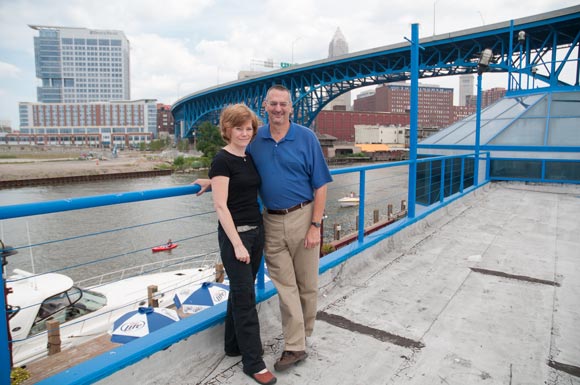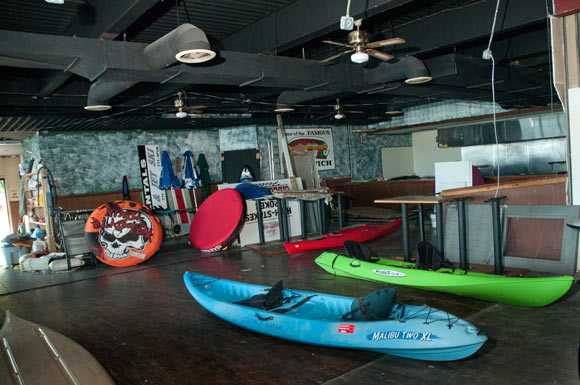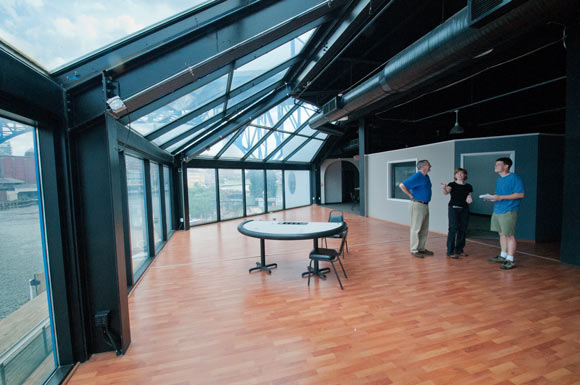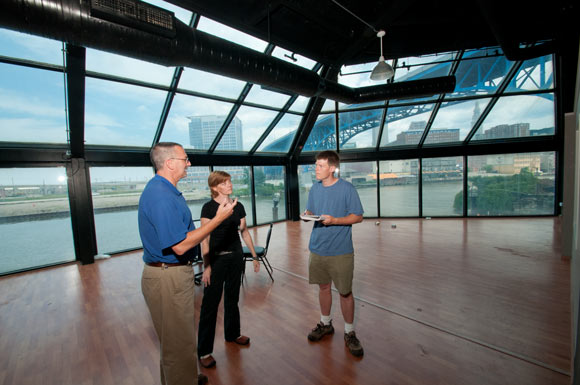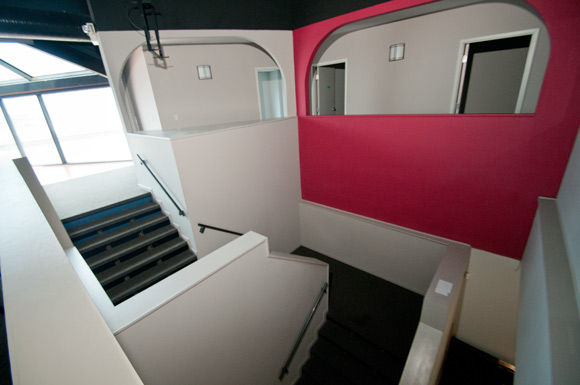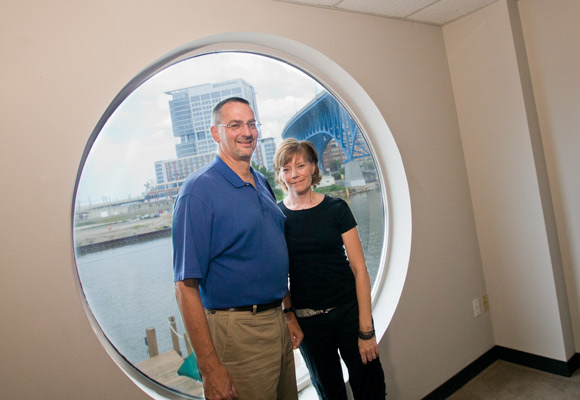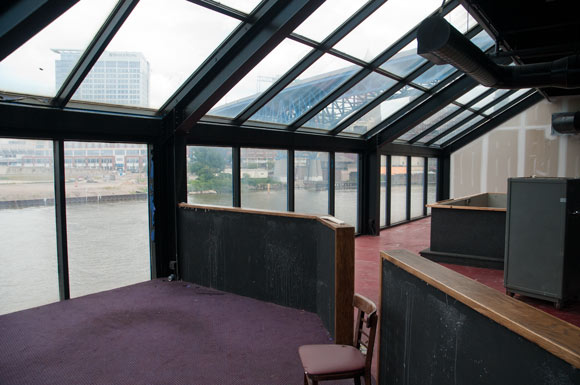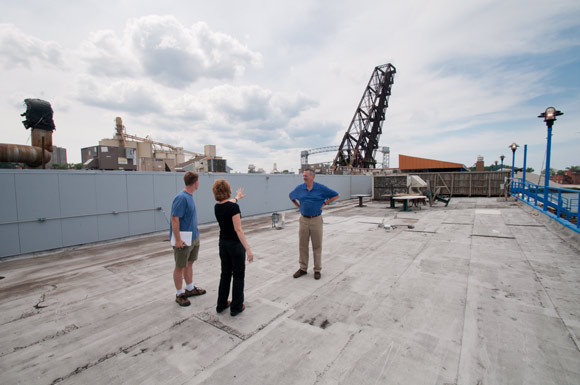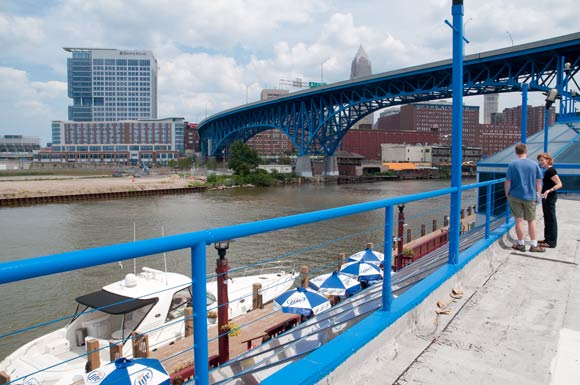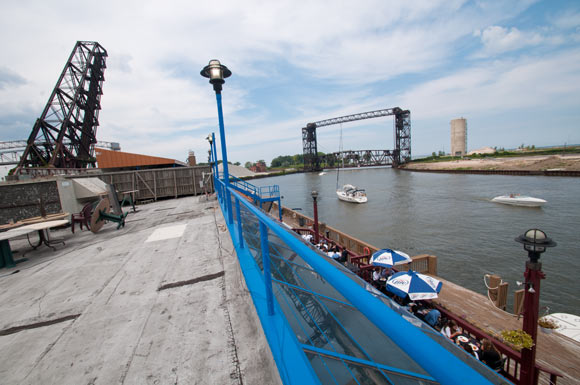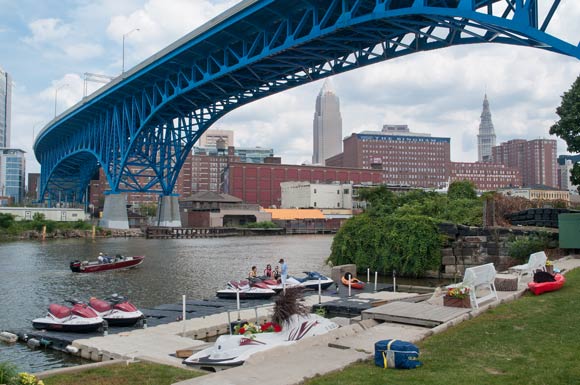hello, cleveland: couple's dream music club taking shape in the flats
Imagine seeing Lucinda Williams, Jeff Tweedy or Aimee Mann in an intimate, 300-seat venue overlooking downtown Cleveland. You’ve paid top dollar for tickets, but you’ve got a comfortable table, a nice bottle of wine, and your loved one by your side. You sit back and enjoy, reveling in being close enough to see the artist’s face while hearing every note.
If one couple has their way, this image might soon be reality.
That couple is Mike and Colleen Miller, marketing and concert industry veterans who lived in Chicago before moving back to Cleveland three years ago. They've already signed a lease with the Jacobs Group to launch The Music Box, a supper club with two stages, windows that overlook downtown, ample parking, and a concept that’s already been successful in other cities.
The new music hall will be located in a 15,000-square-foot, two-story building on the Flats West Bank, in the former Club Coconuts space adjacent to Shooters and the Improv. The venue will feature outdoor dining both along the riverfront as well as on a second-level deck offering great views. While there's plenty of entertainment just watching the powerboats, jet-skis, and freighters as big as city blocks, the real shows will be taking place inside.
“At the heart of it is a concert hall sized venue, but a very different approach than has traditionally been done in the concert industry,” explains Mike Miller. “It’s basically an old-style supper club with nice tables, food, a nice bottle of wine. You eat dinner and see a show. We have fabulous rock clubs here, but this is a nicer experience. For the baby boomer crowd, going to a rock club isn’t something they want as much anymore.”
The couple went looking for a venue in the Flats after seeing the rebirth of the East Bank. They quickly found one that “screamed our concept,” says Miller of the property, which boasts high ceilings, free-flowing sightlines, and exposed iron beams.
“It’s still the Flats…,” he begins, before his better half finishes his sentiment.
“It’s about steel, iron, water and rust,” says Colleen Miller, who has been programming concerts for several decades, including 17 years at the Old Town School of Folk Music followed by a stint at the Chicago Winery. She's booked the likes of Dickey Betts of the Allman Brothers and Rhett Miller of the Old 97’s.
For the Music Box to be successful it must draw tens of thousands of people annually to a new venue in the Flats, a district still waking from a decade-long slumber. Sure, that area has gotten a big boost from the new Greater Cleveland Aquarium, but there's no shortage of entertainment options these days.
Miller says the Music Box will offer something different from what already exists in the marketplace. Too often, he says, big-name acts ignore Cleveland because they can't find the kinds of venues they want to play. The Music Box will fill a gap by providing a high-quality, mid-level venue.
He cites the Chicago Winery, where Colleen Miller is still booking musical acts, as an example of the kind of new-school-meets-old-school model that’s proven successful.
“It’s about the quality of the entire experience," he says. "I’ve seen people just float out of [the Winery] because they’ve had such a wonderful experience throughout the evening.”
While there are plenty of live music venues in town, the Millers don’t believe they have any direct competition. The Music Box will present a range of Americana, folk, blues, rock, country, world, and even classical music not offered at any other local venue. Nighttown has a similar concept, but has only 150 seats in the music room and sticks largely to jazz. Traditional rock clubs like the Beachland don’t offer many seated shows.
Still, Beachland owner Cindy Barber is skeptical that the Northeast Ohio music market can support another hall. She already competes head to head with the Kent Stage for folk and Americana shows. “If anybody can do it, it’s going to be Mike and Colleen, because they have the experience and connections. But there’s already too little audience in the market for the entertainment options we have in Cleveland.”
Barber’s own venue has struggled over the years, but ticket sales have risen more recently, and the Waterloo Arts District continues to generate an increasing amount of buzz. With a streetscape project underway and multiple restaurants slated to open up next year, she says things are improving.
Barber questions whether artists are skipping Cleveland because of a lack of venue choices or because owners can’t pay the high guarantees that big-name artists demand.
“We don’t have the audience to support that, and owners don’t want to lose money all the time," she explains. "People are skipping Cleveland because we can’t deliver audience numbers.”
Colleen Miller says that artists often adjust their fees when playing smaller markets like Cleveland. With ticket prices for well known acts in the $50-70 range, artists could easily take home $15,000 for sell-out shows, which she argues is sufficient. For smaller acts and shows, ticket prices will run $10 to $20.
“There’s competition in any market, but if everybody carves out something unique and works together, we can be successful,” she says. “There’s a void in the marketplace that we’re looking to fill. I believe there is room for all these venues in the market.”
The space that the Music Box will occupy has been largely vacant for more than 10 years before the Jacobs Group leased it to the Millers. David Grunenwald, VP of Development for the Jacobs Group, says that the developer was weathering the recession and waiting for the right concept to come along before leasing out the space to a new operator. In fact, the Jacobs Group is working on a new master plan for the entire district.
The birthplace of Cleveland is quickly changing. Flats East Bank Phase II is preparing to break ground, Flats Forward is assembling a master plan for the area, and developers are trying to revive the water taxi that once ferried bar-hoppers across the Cuyahoga River.
If you’re nostalgic for the ‘80s power pop that one coursed through the Flats, you can still find traces of it. In the Music Box space, which opened as Club Coconuts in 1988, rigging once used to support Volkswagens from the ceiling is still in place. The Millers say they can reuse it when they host Cirque du Soleil style performers with live music, a growing trend in other cities they hope to import.
The echoes of Cleveland’s past, be it the area's industrial heritage or legacy as a thriving entertainment district, is what attracted Mike Miller back to Cleveland. The grandson of a former Cleveland mayor, Miller has the city in his blood. He and his wife currently reside in Cleveland Heights, in the house next door to where he grew up.
“There was a magnetic pull since I met him 25 years ago,” says Colleen Miller, who originally is from Michigan. “It was Cleveland, Cleveland, Cleveland."
For Mike, the Music Box clearly is a legacy project that he hopes will become a lasting treasure for all of Cleveland when it opens next spring. “We want this to become one of the preeminent examples of this kind of new music venue in the country,” he says. “That’s what Cleveland deserves. We invented rock and roll, and we need to be at the forefront.”
Photos Bob Perkoski


